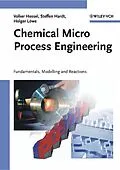Micro process engineering is approaching both academia and industry. With the provision of micro devices and systems by commercial suppliers, one main barrier for using these units has been eliminated. More and more they become familiar, thereby being one facet of the upheaval in chemical industry.
This book focuses on processes rather than on devices: what is 'before' and 'behind' micro device fabrication. A comprehensive and detailed overview is given on:
- A multi-faceted, hierarchic analysis of chemical micro process technology
- Modelling and simulation of micro reactors
- Liquid- and liquid/liquid-phase reactions
- Gas/liquid reactions
- Gas-phase reactions (heterogeneous catalysis)
Autorentext
Volker Hessel, born 1964, was appointed Vice Director R&D and Head of the Chemical Process Development Department at the Institut für Mikrotechnik Mainz GmbH (IMM) in 2002. The development areas of his department encompass the fields of mixing and reaction engineering, process and engineering and heterogeneous catalysis, and electrochemical processes. In 1999 he became Head of the newly founded Department of Microreaction Technology, the predecessor organization of the above mentioned department. In 1996, he was appointed Group Leader for Microreaction Technology. In 1994, he joined the IMM as an employee, He obtained his Ph.D. at the University of Mainz in the field of organic chemistry in 1993, investigating structure-property relations of supramolecular structures.
His is author of more than 70 publications in the field of organic chemistry and chemical micro process engineering and 15 patents.
Steffen Hardt, born 1966, was appointed Head of the Fluidics & Simulation Department at Institut für Mikrotechnik Mainz GmbH (IMM) in 2001. He joined IMM in 1997 as an employee and became Group Leader for modeling and simulation in 1999. The activities of his department are centred around the development and simulation of micro fluids systems. Among his areas of interest are fluidic actuators, multi-phase micro flows, micro mixers, gas-phase reactors and Lab-on-a-Chip systems. Before he became involved in micro fluidics, he worked in the field of theoretical elementary particle physics. He studied physics at the University of Giessen and the University of Washington/Seattle and obtained his Ph.D. with a thesis on quark models.
He is author of more than 30 publications in the field of microfluidics, modeling, and theoretical physics and 10 patents.
Holger Löwe, born in 1953, was appointed Director R&D at Institut für Mikrotechnik Mainz GmbH (Imm) in 1999. Prior, he was head of the Chemistry/Microreaction Technology Department, after being Group Leader of the Electrochemsitry Group. In 1991, he joined the IMM as an employee. In 1984, he moved to the Faculty of Electrochemistry at the Technical College in Ilmenau. There he was Head of the chemical sector at the internal college. Also in 1984, he attained his Ph.D. on alkylation of phenols. From 1977 to 1984, he worked as Research Group Leader at the Filmfabrik Wolffen. He studied chemistry at the University of Leipzig.
He is author of more than 280 publications and 30 patents.
Klappentext
Micro process engineering is approaching both academic and industry. With the provision of micro devices and systems by commercial suppliers, one main barrier for using these units has been eliminated. More and more they become familiar, thereby being one facet of the upheaval in chemical industry.
This book focuses on processes rather than one devices: what is 'before' and 'behind' micro device fabrication. A comprehensive and detailed overview is given on:
- Deductive analysis and rational design for chemical micro processing
- Modelling and simulation for chemical micro processing
- Microflow liquid-phase reactions (organic synthesis)
- Microflow gas/liquid reactions
- Microflow gas phase reactions (heterogeneous catalysis)
Inhalt
Preface.
List of Symbols and Abbreviations.
1. A MULTI-FACETED, HIERARCHIC ANALYSIS OF CHEMICAL MICRO PROCESS TECHNOLOGY.
1.1 Micro Reactor Differentiation and Process Intensification.
1.2 Consequences of Chemical Micro Processing.
1.3 Physical and Chemical Fundaments.
1.4 Impact on Chemical Engineering.
1.5 Impact on Process Engineering.
1.6 Impact on Process Results.
1.7 Impact on Society and Ecology.
1.8 Impact on Economy.
1.9 Application Fields and Markets of Micro Reactors.
2. MODELLING AND SIMULATION OF MICRO REACTORS.
2.1 Introduction.
2.2 Flow Phenomena on the Micro Scale.
2.3 Methods of Computational Fluid Dynamics.
2.4 Flow Distributions.
2.5 Heat Transfer.
2.6 Mass Transfer and Mixing.
2.7 Chemical Kinetics.
2.8 Free Surface Flow.
2.9 Transport in Porous Media.
3. GAS-PHASE REACTIONS.
3.1 Catalyst Coatings in Micro Channels: Techniques and Analytical Characterization.
3.2 Micro Reactors for Gas-Phase Reactions.
3.3 Oxidations.
3.4 Hydrogenations.
3.5 Dehydrogenations.
3.6 Substitutions.
3.7 Eliminations.
3.8 Additions and Coupling Reactions.
4. LIQUID- AND LIQUID/LIQUID-PHASE REACTIONS.
4.1 Micro Reactors for Liquid-phase and Liquid/Liquid-phase Reactions.
4.2 Aliphatic Nucleophilic Substitution.
4.3 Aromatic Electrophilic Substitution.
4.4 Aliphatic Electrophilic Substitution.
4.5 Aromatic Nucleophilic Substitution.
4.6 Aromatic Substitution by Metal Catalysis or Other Complex Mechanisms.
4.7 Free-radical Substitution.
4.8 Addition to CarbonCarbon Multiple Bonds.
4.9 Addition to CarbonHetero Multiple Bonds.
4.10 Eliminations.
4.11 Rearrangements.
4.12 Oxidations and Reductions.
4.13 Organic Synthesis Reactions of Undisclosed Mechanism.
4.14 Inorganic Reactions.
5. GAS/LIQUID REACTIONS.
5.1 Micro Reactors for Gas/Liquid Reactions.
5.2 Aromatic Electrophilic Substitution.
5.3 Free Radical Substitution.
5.4 Addition to CarbonCarbon Multiple Bonds.
5.5 Addition to CarbonHeteroatom Multiple Bonds.
5.6 Oxidations and Reductions.
5.7 Inorganic Reactions.
Index.
